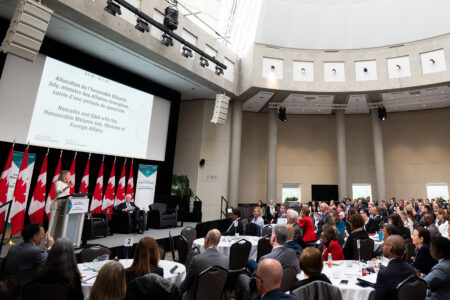
Under Canada’s previous minister of foreign affairs, the government launched a process to consider incorporating penalties for human rights abuses into federal sanctions law as part of the legislated parliamentary review of two statutes: The Special Economic Measures Act (SEMA) and the Freezing Assets of Corrupt Foreign Officials Act. Specifically, the government is considering adopting legislative measures, inspired by European Union and US laws, that would apply sanctions against countries and individuals who commit grave human rights violations. The impetus was the US “Magnitsky law,” which imposes sanctions on Russian officials responsible for the torture and death in custody of Sergei Magnitsky, a lawyer who uncovered wrongdoing by the Russian government.
Given new uncertainty about Canada’s relationship with Russia as well as US President Donald Trump’s ability to remove existing sanctions against Russia, it will be interesting to see whether Foreign Minister Chrystia Freeland pursues the same direction on sanctions as her predecessor. We argue that additions to existing Canadian legislation are the wrong choice at this time, for three reasons.
First, none of the more than five federal statutes related to sanctions confers extraterritorial jurisdiction: the ability for Canada to take legal action against non-Canadians beyond our national borders. Canadian sanctions regulations can be used to seize the property and assets of individuals and states in Canada or the property of Canadians abroad, but our legislation cannot target assets held by non-Canadians abroad. New legislative amendments would not change this reality.
Although new reports suggest Canada could perhaps be a more attractive tax haven than previously thought, our banking system remains robust and prevents money laundering and the creation of safe havens for the spoils of foreign corruption. In short, foreign human rights abusers who could be targeted by any changes to the legislation are already unlikely to park their money in Canada, since our banking standards do act as a strong disincentive, in comparison with those of many other countries.
Second, Canada’s contribution to combatting human rights abuses is most effective when we work with other states, especially the EU and the US. In these circumstances, Canada already has the ability to target human rights abusers through existing legislation: our United Nations Act allows Canada to target abusers whenever it is triggered for that purpose, and SEMA allows Canada to take action against human rights abuses deemed to be “a grave breach of international peace and security.” If legislative changes lower the threshold for Canadian action to allow our country to act alone even when there is no threat to global peace, we would essentially be volunteering to be the world’s police officer on human rights abuses. As much as we’d like to capture every abuser, Canada lacks the resources to play that role effectively, especially if our traditional allies back away from cooperative effort.
To give effect to sanctions regulations, the onus is mostly on banks and private companies, which must ensure they comply with the myriad regulations created by the government.
Third, to give effect to Canada’s sanctions regulations, the lion’s share of the onus is on Canadian banks and private companies, which must ensure they comply with the myriad regulations created piecemeal by the government. At present, each statute lists different definitions of “assets” and different penalties. Canada also has no consolidated list of sanctioned individuals and states to consult, unlike the US and the EU. Our government provides neither legal advice nor guidance on how to interpret the regulations, so banks and private companies either hire lawyers (who then pass along these costs to Canadians) or take their chances with their own interpretation. Sometimes the sanctions laws backfire and companies get caught violating them, as was the case for an Alberta company fined $90,000 after a reported mailroom mix-up that led to $15 worth of equipment destined for the United Arab Emirates being sent to Iran instead. Canada’s regulations have caught genuine sanctions violators in the past, but the number of cases is few and likely would not increase significantly with more sanctions regulations.
Canada is not even keeping pace with its current sanctions obligations on the world stage. For example, although the UN lifted all sanctions against Liberia in the spring of 2016, Canada still has not updated its regulations. Before broadening our statutes to embrace an issue that laws are ill-suited to tackle, Canada should come to grips with its existing legislative requirements. Adding new categories of sanctions will only increase the administrative burden for banks and other companies without preventing human rights abuses. Human rights abuses are abhorrent wherever they occur in the world, and the government is right to take strong action. But broadening our sanctions legislation is not the right tool and would merely pass the buck for enforcement to Canada’s private sector.
Photo: Shutterstock.com
Do you have something to say about the article you just read? Be part of the Policy Options discussion, and send in your own submission. Here is a link on how to do it. | Souhaitez-vous réagir à cet article ? Joignez-vous aux débats d’Options politiques et soumettez-nous votre texte en suivant ces directives.






